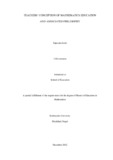
Please use this identifier to cite or link to this item:
https://hdl.handle.net/20.500.14301/226Full metadata record
| DC Field | Value | Language |
|---|---|---|
| dc.contributor.author | Joshi, Dipendra | - |
| dc.date.accessioned | 2023-04-23T12:12:12Z | - |
| dc.date.available | 2023-04-23T12:12:12Z | - |
| dc.date.issued | 2012-12 | - |
| dc.identifier.citation | Joshi,D.(2012).Teachers’ conception of Mathematics Education and Associated Philosophy. | en_US |
| dc.identifier.uri | https://hdl.handle.net/20.500.14301/226 | - |
| dc.description.abstract | This dissertation entitled “Teachers’ Conception of Mathematics Education and Associated Philosophy” is an ethnographic inquiry which aims at investigating the guiding philosophy of the Secondary level Mathematics Education in Nepal. The following two questions guided the study: 1) How do teachers perceive teaching and learning of mathematics? How can those perceptions be linked with philosophies of Mathematics education? 2) Which philosophical approach(s) is/are more appropriate for incorporating real life experiences in teaching Mathematics? How and why? In this dissertation, I interacted with the participants on the basis of open-ended research questions. The recorded interviews were transcribed, themetized and analyzed using peer debriefing as well as triangulation. The data suggest that teachers perceive teaching and learning Mathematics as an active process where the role of teacher is supporting the learners in knowledge construction rather than transferring the knowledge. Teachers perceived contextualized curriculum to be better than centrally documented curriculum and child- centered ways of teaching to be is unquestionably a better method of teaching than teacher-centered methods. Similarly, they perceived continuous and multiple ii classroom assessments need to be implemented for evaluating students. But, they showed limited classroom practice of these aspects to assess their students' learning. Findings of the research showed that one of the main reasons for the lower performance level in Mathematics is the lack of ability of students and the teachers to see a direct connection between the Mathematics studied in school and their life concerns outside the classroom. The teachers’ perceptions of collaborative learning, creative thinking and Problem Solving strategies as effective methods of teaching showed constructivism as a basic guiding philosophy of Mathematics Education. The constructivist framework seeks to understand multiple perspectives and challenges the learners’ thinking. This shows we need to devise multiple approaches and strategies of teaching learning to incorporate real life experiences in our Mathematics Education. | en_US |
| dc.language.iso | en | en_US |
| dc.title | TEACHERS’ CONCEPTION OF MATHEMATICS EDUCATION AND ASSOCIATED PHILOSOPHY | en_US |
| dc.type | Dissertation | en_US |
| local.school.name | SOED | en_US |
| local.school.department | DOSE | en_US |
| local.school.program | Master of Education in Mathematics Education | en_US |
| local.school.level | Masters | en_US |
| Appears in Collections: | Dissertation | |
Files in This Item:
| File | Description | Size | Format | |
|---|---|---|---|---|
| Final copy for Print.pdf | 1.41 MB | Adobe PDF |  View/Open |
Items in DSpace are protected by copyright, with all rights reserved, unless otherwise indicated.